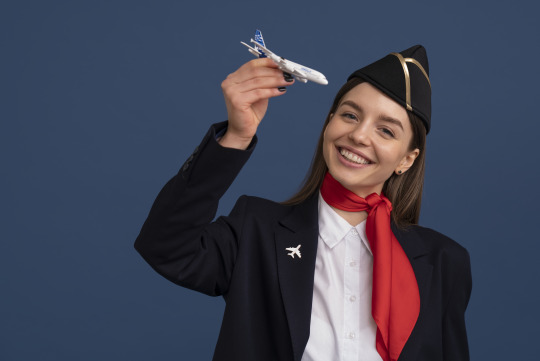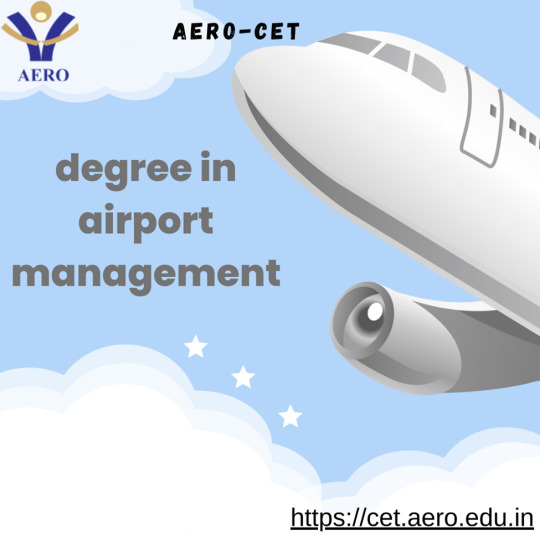#aviation management
Explore tagged Tumblr posts
Text
Certified BBA in Airline Operation Hospitality in Kolkata

Discover your wings with a Certified BBA in Airline Operation Hospitality!
Elevate your career in the aviation industry by mastering airport operations, passenger service, and hospitality management. For the sky-high opportunities with Airway India, the premier college in Kolkata for the Best BBA in Airline Operation Hospitality Management. Enroll now! Soar to new heights and be ready to fly high in the world of aviation with the expert training and industry connections provided by Airway India. Your dream career awaits! For more quires visit their website at www.airwayindia.in
Phone no- +91 86970 38522
Email- [email protected]
#aviation programs#aviation college#aviation management#aviation industry#bba in hospital management#bba in aviation#airlines#airhostess programs#cabin crew
3 notes
·
View notes
Text
aviation management
Career with a BSc Aviation Management Degree
The aviation industry, a dynamic and ever-evolving sector, offers a plethora of exciting career opportunities beyond the cockpit. If you're passionate about aviation but prefer a behind-the-scenes role, a BSc in Aviation Management could be your perfect launchpad. This degree equips you with the business acumen and specialized knowledge needed to navigate the complexities of this global industry.This undergraduate program blends business administration principles with aviation-specific subjects.
Airport Operations: Learn about ground handling, passenger services, security protocols, and air traffic control coordination.
Airline Management: Explore revenue management, flight scheduling, fleet planning, and customer relationship management.
Aviation Regulations and Safety: Grasp the intricate legal framework and safety standards governing the industry.
Aviation Marketing and Finance: Develop skills in promoting aviation services and managing financial aspects within aviation companies.
Logistics and Supply Chain Management: Understand the movement of cargo and the complex supply chains supporting aviation.
Career Opportunities:
A BSc in Aviation Management opens doors to diverse career paths, including:
Airport Manager/Operations Manager: Oversee the day-to-day operations of an airport, ensuring efficiency and safety.
Airline Operations Manager: Manage flight schedules, crew assignments, and ground operations for an airline.
Aviation Safety Manager: Develop and implement safety protocols to minimize risks and ensure compliance with regulations.
Ground Operations Manager: Supervise ground handling activities, including baggage handling, passenger check-in, and aircraft servicing.
Aviation Marketing and Sales Manager: Develop and execute marketing strategies to promote airline or airport services.
Cargo Manager: Manage the transportation of goods via air, ensuring timely and efficient delivery.
Aviation Consultant: Provide expert advice to aviation companies on various aspects of their operations.
Air Traffic Controller (with further training): While the BSc gives a good background, to be an air traffic controller, specific further training and licensing is needed.
Aviation Insurance Underwriter: Assess risks and provide insurance coverage for aviation assets.
Why Choose BSc Aviation Management?
Industry Growth: The aviation industry is projected to experience significant growth in the coming years, creating ample job opportunities.
Global Exposure: Aviation is a global industry, offering opportunities to work in different countries and cultures.
Dynamic and Challenging: The industry is constantly evolving, presenting new challenges and opportunities for innovation.
Competitive Salaries: Aviation management professionals typically earn competitive salaries and benefits.
Diverse Skill Set: The program equips you with a broad range of skills, making you adaptable to various roles.
Essential Skills:
To succeed in aviation management, you'll need:
Strong Communication and Interpersonal Skills: To effectively interact with passengers, staff, and stakeholders.
Analytical and Problem-Solving Skills: To address operational challenges and make informed decisions.
Leadership and Management Skills: To motivate teams and manage resources effectively.
Attention to Detail: To ensure compliance with regulations and maintain safety standards.
Technological Proficiency: To utilize aviation management software and systems.
Conclusion:
A BSc in Aviation Management provides a solid foundation for a rewarding career in a dynamic and growing industry.and to study in best colleges in india With the right skills and dedication, you can soar high and contribute to the future of aviation. This program is a great opportunity for those who have a passion for airplanes, and the business that makes them fly.
0 notes
Text
Discover how technology is transforming the Aviation Management Course in Kolkata, integrating AI, VR, and automation for next-gen aviation professionals.
0 notes
Text
Explore The Horizons With An MBA In Aviation Management In India
The aviation industry is soaring, offering boundless opportunities for aspiring professionals. An MBA in Aviation Management in India equips students with the skills and knowledge needed to excel in this dynamic sector. This specialized program focuses on areas like airport operations, airline management and logistics, making it a perfect fit for those looking to lead and innovate in the aviation domain.
What Is An Aviation MBA?
An Aviation MBA is a specialized program designed for individuals passionate about the aviation sector. It combines core business principles with aviation-specific training, preparing graduates for roles in airline management, airport operations, aviation consulting and more. Students learn about regulatory frameworks, safety management and global aviation trends while gaining expertise in finance, marketing and organizational behavior tailored to the aviation industry.
Top Features Of Aviation MBA Programs In India
India has emerged as a hub for world-class aviation education. With a growing demand for skilled professionals, institutions are offering programs that blend theoretical knowledge with practical exposure.
Features of Aviation MBA Programs in India include:
Industry-relevant curriculum: Covering subjects like air cargo management, aviation law and airport planning.
Hands-on experience: Opportunities to work on live projects, internships with leading airlines and simulation exercises.
Networking opportunities: Interaction with industry leaders through seminars, workshops and guest lectures.
These programs cater to aspiring professionals who aim to work with airlines, airport authorities, logistics companies and aviation consultancy firms.
Why Choose India For An MBA In Aviation Management?
India is one of the fastest-growing aviation markets globally, making it an ideal destination for pursuing an MBA in this field. With increasing air traffic and government initiatives to boost the sector, the demand for skilled professionals is at an all-time high. Indian institutions offering aviation MBA programs ensure that graduates are well-equipped to meet the challenges and opportunities in this industry.
DY Patil University: A Leading Name In Aviation Education
When discussing the best options for an MBA in Aviation Management in India, DY Patil University (DYPU) stands out as a leader. Known for its excellence in education, DYPU offers a cutting-edge MBA program in Aviation Management. The university’s curriculum is meticulously crafted to align with industry needs, combining academic rigour with practical insights.
DYPU provides students with state-of-the-art facilities, experienced faculty and unparalleled industry exposure. With a focus on creating future-ready professionals, the program emphasizes critical thinking, leadership and innovation. Graduates of DYPU’s MBA in Aviation Management are well-positioned to take on high-impact roles in airlines, airport operations and aviation consultancy.
Conclusion
An MBA in Aviation Management in India is a gateway to an exciting and rewarding career in the aviation sector. With a plethora of opportunities and a growing demand for skilled professionals, this program is ideal for those looking to make a mark in the industry. Institutions like DY Patil University offer unparalleled education and exposure, ensuring that students are ready to navigate the challenges of this dynamic field. Embark on your aviation journey today with DYPU and watch your career take flight!
1 note
·
View note
Text
The Quest for a Stable Career: Why Aviation Outshines Traditional Fields
In today's fast-paced world, securing a well-paying job at the beginning of one's career is crucial. The days of waiting 15 years to land a dream job are long gone, and with fierce competition, traditional career paths no longer guarantee high salaries. Fields like law and chartered accountancy (CA) have been considered prestigious, but they don't always deliver the financial rewards that many expect.
Let's dive into the statistics to understand the realities of these traditional career paths. The average starting salary for a newly qualified Chartered Accountant in India ranges from INR 6 to 7 lakhs per annum. While this might seem promising, the story isn't the same for everyone. On the lower end, some CAs start with salaries as low as INR 3 lakhs per annum, and with the high level of competition, securing top-tier positions isn't guaranteed. Even in law, where corporate law offers lucrative salaries, other branches like family law or criminal law might offer starting wages of just INR 2 to 3 lakhs annually. The road to success in these fields is long, uncertain, and filled with competition. For students pursuing a Bachelor of Business Administration (BBA), the situation is even more challenging. A BBA degree alone often isn't enough to secure a high-paying job, pushing many students to pursue a Master's in Business Administration (MBA) to improve their prospects. However, even an MBA is no longer a surefire ticket to a lucrative career. With the market flooded with MBA graduates, competition is fierce, and salaries vary widely. While top-tier MBA graduates can command impressive salaries, many start their careers with packages that are far from the high figures often associated with an MBA. On the lower end, MBA graduates might earn around INR 4 to 5 lakhs per annum, a stark contrast to the expectations set by the degree.
On the other hand, the aviation industry presents a compelling alternative, offering stable career growth and a more predictable path to success. The aviation sector, especially in the areas of aviation and hospitality management, is burgeoning with opportunities. With the right training and education, a career in this industry is not only attainable but also comes with the promise of steady salary growth and the flexibility to shift to other career profiles.
For instance, a fresh graduate with a BSc in Aviation and Hospitality can expect a starting salary of around INR 5 to 6 lakhs per annum. This is comparable to the starting salaries in traditional fields but with a much more predictable trajectory. Within a few years, professionals in this industry can see their salaries rise significantly, with mid-career professionals earning between INR 10 to 12 lakhs per annum. Moreover, the aviation industry offers unique opportunities for career progression. With the right experience, individuals can move into roles such as airport management, airline operations, or even transition into related fields like travel and tourism, all of which offer competitive salaries and job stability.
A key player in this field is Wingsss Aviation and Hospitality in Pune, a premier institute renowned for its comprehensive training programs. The institute is known for its excellent placement record, with graduates consistently securing positions in top airlines and hospitality firms. The training at Wingsss Aviation and Hospitality is designed to be seamless, integrating both theoretical knowledge and practical experience to ensure that students are job-ready from day one.
The aviation and hospitality sectors are also less saturated than traditional fields, meaning there is less competition for top positions. The industry is expanding rapidly, driven by the growth in global travel and tourism. This expansion translates to more job opportunities and higher demand for qualified professionals, making it a smart choice for those looking to secure a stable and lucrative career.
In conclusion, while traditional career paths like CA and law have their merits, they come with significant challenges, including high competition and uncertain financial rewards. On the other hand, the aviation industry offers a more reliable and rewarding career path, especially for those who choose the right institute. Aviation and hospitality management courses provide not only immediate job prospects but also long-term career growth and the flexibility to explore various roles within the industry. For anyone looking to kickstart their career with a good salary and steady growth, the aviation industry, particularly through institutions like Wingsss Aviation and Hospitality in Pune, presents a compelling option.
#bsc aviation and hospitality#diploma in cabin crew#aviation and hospitality management courses#diploma in airport management#aeronautical engineering#cabin crew#air hostess course#aviation course#airport management course#aviation management#diploma in aviation
0 notes
Text

Rinsha Pattakal, a native of Malappuram, has made history by becoming the first woman in Kerala to be granted a licence for small-category drones by the prestigious Directorate General of Civil Aviation (DGCA). Her outstanding achievement is sure to inspire future generations. Rinsha has broken gender norms by climbing new heights with her unwavering passion for drone technology and unflinching determination.
ASAP KERALA
0 notes
Text
MBA Airport Management

ILAM India offers an advanced MBA Airport Management program aimed at developing future leaders in the aviation industry. This program covers essential topics such as airport operations, strategic planning, financial management, and aviation law. With a focus on real-world applications and industry trends, ILAM India prepares students to tackle complex challenges and excel in the dynamic field of airport management.
1 note
·
View note
Text
Best Aviation Management Courses in Trivandrum
Find the Best Aviation Management Courses in Trivandrum at GioMacs Academy. We at GioMacs provide job oriented diploma course and certification courses with feasible fees amount. Enroll at GioMacs Academy Today.

Our courses have been carefully designed to address every aspect of aviation management, including regulatory compliance, airport operations, airline management, and aviation safety. This guarantees that our students are equipped to meet the demands of the aviation sector.
0 notes
Text
Explore your dreams high in the sky: Aeronautical Engineering and Research Organization CET Gateway to Air Hostesses Training Scholarship.

Introduction: You dream high above the clouds, travel in the sky and discover the vision new? If you have your heart set on working in aviation, especially as a flight attendant, the Aeronautical Engineering and Research Organization CET (AERO CET) could be your ticket to success. With its innovative curriculum and commitment to empowering aviation professionals, AERO CET offers you a unique opportunity to fulfill your dreams in aviation education. About Aeronautical Engineering and Research Organization CET: AERO CET is not just an academic institution; The door is open to ambitious people who dare to dream big and strive to make a place for themselves in the powerful airline industry. Focusing on aircraft design, flight management and related fields, AERO CET provides students with the knowledge, skills and experience necessary to succeed in their chosen career path. Introduction: A Course for Prospective Aviation One of the highlights of AERO CET is that it supports students in achieving their aviation goals, including those who want to become flight attendants. airplane. Through the flight training program, AERO CET aims to provide candidates with specialized training and preparation as flight attendants. Conclusion: Finally, Aeronautical Engineering and Research Organization CET (AERO CET) is not just a learning center; it is a gateway to endless opportunities in the world of aviation. With its commitment to excellence, innovation and student engagement, AERO CET is making dreams come true and shaping the future of aviation professionals. Whether you want to be an Aeronautical Engineer, a Flight Controller or a Flight Controller, AERO CET provides the opportunities, resources and support you need to reach new heights. Join AERO CET and embark on a challenging and exciting journey of discovery, growth and achievement in the world of aviation.
visit for more information: https://cet.aero.edu.in/diploma-program/
#diploma in aviation management#aviation course#aviation management#diploma in aviation#aviation and hospitality management courses
1 note
·
View note
Text
Get Up to Success with a Diploma in Aviation Management
The Eagle Aviation General Aviation Management Diploma provides industry experts with a first-class general management education without intruding on their careers. The program is designed to balance theory and practical application, being aware of the need for today's managers and business leaders to develop and implement operational solutions, while ensuring their organizations' strategy. Boost your ambitions and fly towards a promising future with Eagle Aviation's Diploma in Aviation Management. From understanding flight operations to mastering aviation regulations, students delve into diverse facets of aviation management under the guidance of industry experts. Whether aspiring to lead airline operations, airport management, or aviation logistics, this diploma sets the foundation for a thriving career above the clouds.
1. Develop and explore your management skills on various management topics.
2. Define your leadership style and identify the remaining leadership styles.
3. Explain the complexity of an organization and its various needs and challenges.
4. Facilitate shows and course orders actively and be able to value their success.
5. Apply Project management skills to your current projects.
6 . Create a personal development plan for further learning and development.
0 notes
Text
Dive into the world of Digital Twin Technology within Airport Operations Centre (APOC), uncovering its definition, functionalities, and operational significance. Understand how this innovative approach enhances efficiency and decision-making in airport management.
#Digital Twin Technology#APOC#Airport Operations Centre#Aviation Management#Digital Twins in Aviation#APOC Technology#Aviation Innovation#airport technology#airport#aviation#airport operations
1 note
·
View note
Text
Discover the duration and career prospects of an air hostess course.
Embarking on a career as an air hostess, or flight attendant, can be an exciting and rewarding journey. These professionals play a crucial role in ensuring the safety, comfort, and well-being of airline passengers. If you're considering pursuing a career in this field, you may be wondering about the duration of an air hostess course and what lies ahead. In this blog post, we'll explore the typical duration of an air hostess course and outline the steps you can take to kickstart your career in aviation.
Duration of Air Hostess Courses:
The duration of an air hostess course can vary depending on several factors, including the type of program, the educational institution offering the course, and the specific curriculum requirements. In general, air hostess courses can range from a few weeks to several months in duration.
Short-Term Courses:
Some institutions offer short-term air hostess courses that can be completed in just a few weeks. These intensive programs are designed to provide students with basic training in areas such as customer service, safety procedures, in-flight service, and emergency protocols. Short-term courses may be suitable for individuals who are looking to quickly acquire the necessary skills and qualifications to pursue entry-level positions as flight attendants.
Longer Duration Courses:
On the other hand, there are also longer duration air hostess courses that span several months. These comprehensive programs typically delve deeper into various aspects of the role, including aviation regulations, first aid training, cultural sensitivity, and conflict resolution techniques. Longer duration courses may also include practical training components, such as mock cabin simulations or on-the-job training experiences.
Path Forward After Completing an Air Hostess Course:
Once you have completed an air hostess course, you'll be equipped with the knowledge, skills, and certifications needed to pursue a career as a flight attendant. Here are some steps you can take to kickstart your career in aviation:
1. Apply for Job Openings: Keep an eye out for job openings at airlines or aviation companies. Many airlines regularly recruit new flight attendants and may conduct interviews and assessment sessions to select suitable candidates.
2. Attend Interviews and Assessments: If you're invited for an interview or assessment session, be prepared to showcase your communication skills, professionalism, and ability to handle various situations. Dress appropriately and demonstrate your enthusiasm for the role.
3. Undergo Additional Training: Upon securing a position as a flight attendant, you may undergo additional training provided by the airline. This training may cover specific procedures, policies, and equipment used by the airline, as well as emergency response protocols.
4. Gain Experience and Advance Your Career: As you gain experience in the field, you may have the opportunity to advance your career by taking on leadership roles, pursuing specialized training, or transitioning to roles in corporate aviation or management.
Conclusion:
In conclusion, the duration of an air hostess course can vary depending on the program and institution, ranging from a few weeks to several months. After completing an air hostess course, you can pursue a career as a flight attendant by applying for job openings, attending interviews and assessments, undergoing additional training, and gaining experience in the field. With dedication, passion, and a commitment to excellence, you can embark on a rewarding career as an air hostess and make a positive impact in the aviation industry.
For more information Visit: https://sgipune.in/
#aeronautical engineering#cabin crew#air hostess course#aviation course#airport management course#aviation management#diploma in aviation
0 notes
Text
youtube
The aviation management degree from top MBA aviation colleges in India can indeed be a fascinating career choice for MBA graduates, offering a unique blend of business acumen, strategic thinking, and a passion for the aviation industry as a whole. Visit us https://bit.ly/49351z3
0 notes
Text
Which is the best college for MBA in aviation management in Kolkata?
There are a few reputable colleges in Kolkata that offer MBA programs with a specialization in aviation management. However, keep in mind that the "Best" college can vary based on individual preferences, such as program curriculum, faculty, industry connections, and more.

when it comes to pursuing an MBA in aviation management in Kolkata, there are several factors to consider in order to make an informed decision. Here are some insights to help you choose the best college:
Faculty Expertise: Look for a college with experienced faculty members who have a background in aviation and management.
Industry Connections: A college that has strong ties with the aviation industry can provide valuable networking opportunities and practical insights.
Curriculum: Check if the curriculum covers a wide range of topics relevant to aviation management, including operations, finance, and regulatory aspects.
Placement Opportunities: Look for colleges that offer robust placement support and partnerships with prominent aviation companies.
Internship Programs: A college that offers internships with reputable aviation companies can enhance your real-world exposure.
Considering these factors, Airway India, Leading MBA in Aviation Management College in Kolkata, stands out as an excellent choice for an MBA in aviation management. With a dedicated faculty comprising aviation and management experts, strong industry connections with leading airlines, a comprehensive curriculum, and a track record of successful internship placements, they provide a holistic learning experience. Make sure to visit their official website for more information and to see if their program aligns with your career aspirations.
Visit Website at www.airwayindia.in
Address- 18, 1, Jessore Rd, Rathtala, Barasat, Kolkata, West Bengal 700124
Phone no- +91 86970 38522
Email- [email protected]
Facebook- www.facebook.com/AirwayIndiaKolkata
#mba in aviation#aviation progrmas#aviation management#aviation college#aviation industry#aviation placements#airlines
1 note
·
View note
Text
Cabin Crew: A Cornerstone in the Airline Industry and the Success of Flights
The cabin crew, often called flight attendants, play a vital role in the airline industry. They ensure the safety and comfort of passengers on flights. Their duties go beyond serving meals and drinks. They are responsible for many tasks that help flights run smoothly and successfully.
One of the main jobs of the cabin crew is to follow safety procedures and protocols. Before each flight, they perform safety checks to make sure all equipment is working properly. They also give safety briefings to passengers, showing them how to use seat belts, life vests, and emergency exits. During the flight, they keep an eye out for any security threats or emergencies and handle them efficiently.
Cabin crew members also focus on passenger comfort and assistance. They greet passengers as they board the plane, help with seat allocation, and ensure the cabin is secure before takeoff. They answer passenger questions and offer support, especially to those with special needs. In addition, they provide food and beverage services, making sure to respect dietary preferences and restrictions.
During the flight, cabin crew members coordinate with the flight deck to relay important information. They handle passenger issues and complaints with professionalism and tact. They also keep the cabin clean and manage waste disposal.
A typical day for a cabin crew member starts well before the flight. They attend a pre-flight briefing where they receive updates on flight details, weather conditions, special passenger needs, and any security concerns. After the briefing, they prepare the aircraft by performing safety checks and getting the cabin ready for boarding. They balance multiple tasks during the flight, from ensuring safety to providing excellent customer service. After the flight, they conduct a final cabin sweep, report any incidents, and prepare for the next flight.
Choosing a career as a cabin crew member offers many benefits. It is an exciting and dynamic profession that provides opportunities to travel the world and meet people from different cultures. The job requires strong interpersonal and problem-solving skills, making it ideal for those who enjoy working in fast-paced environments and as part of a team. With competitive salaries, travel benefits, and the potential for career advancement, being a cabin crew member is an attractive career option.
Wingsss Aviation and Hospitality is one of the best institutes in Maharashtra for aviation and hospitality management courses, especially for those aspiring to become cabin crew members. The institute's Diploma in Cabin Crew program is well-regarded for several reasons. The curriculum covers all aspects of cabin crew training, from safety procedures to customer service. It includes both theoretical knowledge and practical training, ensuring students are well-prepared for the job. The institute has experienced instructors who bring a wealth of industry knowledge and real-world experience, providing valuable insights and guidance.
Wingsss Aviation and Hospitality also offers state-of-the-art training facilities. These include mock aircraft cabins, emergency evacuation simulators, and hospitality labs. These resources create a realistic training environment that enhances learning. Additionally, the institute has strong connections with leading airlines and hospitality companies, which helps students secure internships and job placements after graduation. This network is crucial for students as they transition from education to employment.
The institute offers a short, intensive one-year diploma course designed to equip students with the necessary skills and knowledge for immediate entry into the industry. Despite its short duration, the course provides comprehensive training that prepares students for a successful career. The focused curriculum, combined with practical training and industry exposure, ensures that graduates are ready for the job and can quickly achieve success in their chosen field.
In conclusion, the role of the cabin crew is essential to the success of airline operations. Their responsibilities include ensuring safety, providing excellent service, and coordinating with the flight deck. A career as a cabin crew member is both challenging and rewarding, offering opportunities for travel and professional growth. Wingsss Aviation and Hospitality stands out as an exceptional institute, providing top-notch training and support to aspiring cabin crew members, making it an excellent choice for those looking to enter this exciting field.
For more information visit: https://wingsss.com/b-sc-aviation-hospitality/
#bsc aviation and hospitality#diploma in cabin crew#aviation and hospitality management courses#diploma in airport management#aeronautical engineering#cabin crew#air hostess course#aviation course#airport management course#aviation management#diploma in aviation
0 notes